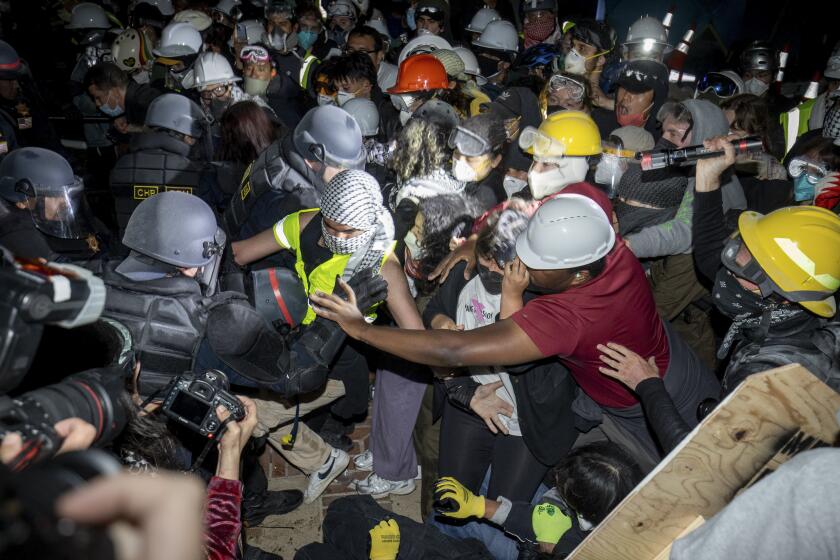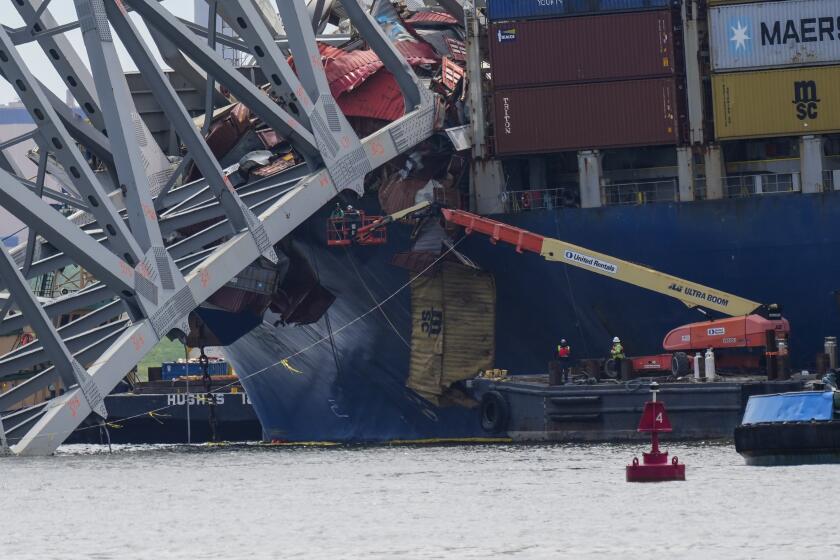Radical Cleric Reaches Out
An influential anti-U.S. Shiite Muslim cleric on Sunday joined the campaign to get Arab Sunni Muslim leaders to help quell the sectarian violence roiling Iraq, even as insurgents continued to attack government officials and American troops.
Muqtada Sadr, who commands thousands of militia fighters in the capital’s slums, sent a delegation to meet with Sunni leaders and appeal for an end to tensions.
At least 10 Shiite and Sunni clerics have been killed in recent weeks, prompting speculation about tit-for-tat assaults. The head of the Muslim Scholars Assn., a Sunni organization, last week blamed several of the killings of Sunnis on the Badr Brigade, a Shiite paramilitary force linked to the Supreme Council for Islamic Revolution in Iraq, the nation’s largest Shiite political movement.
Sadr, who had been in hiding since a high-profile clash with U.S.-led forces last August, told Al Arabiya satellite television that he had returned to the political scene to try to reconcile Muslim factions.
“Iraqis need to stand side by side at this time,” Sadr said, warning that extremists were provoking civil war.
Sadr’s return to prominence could be seen as a challenge to U.S. authority in Iraq. He and his militants have made withdrawal of foreign forces a prerequisite for participation in the emerging political process.
A U.S. official who spoke on condition of anonymity indicated that Sadr’s activism would be tolerated by Washington so long as he refrained from “crossing red lines,” or violating the U.S.-backed government’s goal of peaceful restoration of order and national reconciliation.
Sadr’s gesture followed Saturday’s vow by Sunni clerics, politicians and tribal leaders to unite to recover a measure of the political clout they enjoyed before Saddam Hussein was ousted as president.
Shiites and Kurds hold the most powerful positions in the new government.
The Sunni leaders said they would try to forge a common strategy for engagement with Shiites and Kurds in drafting a new constitution and in campaigning for the National Assembly to be elected in December.
Sunnis who belonged to Hussein’s disbanded Baath Party have been blamed for driving the insurgency that continues to frustrate reconstruction efforts and security more than two years after the U.S.-led invasion brought 150,000 troops here.
In less than three weeks since the transitional Iraqi government took power, hundreds of people have died in suicide attacks, drive-by shootings and roadside bombings.
On Sunday, insurgents assassinated Trade Ministry auditing chief Ali Moussa and his driver as they were making their way to his office around 9 a.m.
A similar scene was replayed at 9 a.m. today, when an aide to Prime Minister Ibrahim Jafari, Wail Rubaiee, was gunned down with his driver in Baghdad’s Mansour neighborhood, officials in the Interior Ministry said.
On Sunday, a U.S. soldier died after a suicide bombing near Tikrit, Hussein’s hometown about 100 miles north of Baghdad, the military reported. Two U.S. troops and two Iraqis were wounded in the attack near American military vehicles and an Iraqi police station.
Roadside bombs killed an Iraqi policeman near the northern city of Kirkuk.
Police said they captured a suspected car-bomb builder and associate of insurgent leader Abu Musab Zarqawi.
Ismail Budair Ibrahim Obeidi, also known as Abu Omar, was captured Tuesday northeast of Baghdad in Baqubah, a government statement said, according to Associated Press.
Also, three kidnapped Romanian journalists managed to escape their captors, the government of Romania announced.
Iraq’s Justice Ministry confirmed that one of Hussein’s jailed former lieutenants had been released from U.S. custody late last month so he could seek treatment for terminal cancer.
The decision to free Ghazi Hammud Obeidi, a former Baathist leader for the city of Kut, was made by U.S. forces before the June 28 transfer of authority to Iraqi forces, said Abdulkarim Alinizy, deputy national security affairs minister. Alinizy suggested Obeidi could still be returned to Iraqi custody if a committee reviewing the decision so ordered.
The spree of assassinations of senior clerics from both Shiite and Sunni communities in recent weeks has triggered fears of civil war. Despite the relentless violence, officials here contend that they continue to call the shots in administering the country, saying that U.S. officials offer only advice and guidance.
“Our relationship with the United States is distinctive because of the presence of about 140,000 of their soldiers on our land according to an agreement which will be renewed soon,” said Laith Kubba, a spokesman for Jafari. He said the foreign forces would remain only until enough Iraqi police and security troops had been trained to replace them.
U.S. officials have been pushing the new government to draw moderate Sunnis into the new power structure, to fracture support for the insurgents.
“A lot of informal meetings between Sunni and Shiite leaders have taken place about how to put this genie back in the bottle,” a U.S. diplomat said of the recent Sunni-Shiite violence. “Dialogue is good, but we would like to see more Sunni leaders come out publicly against the insurgency.”
Sadr, the Shiite cleric, by acting Sunday, may have sensed an opportunity to exploit popular discontent with sectarian violence by extending an olive branch to Sunnis.
Sadr’s Al Mahdi militia battled U.S. troops in several bloody clashes last year in the holy city of Najaf and in Sadr City, a neighborhood of Baghdad named for his father. After U.S. officials shuttered Sadr’s newspaper last spring, the cleric launched a string of protests that tapped into anti-American sentiment nationwide and fueled a series of rebellions. In the summer, he agreed to disarm the militia, but there have been reports that he is trying to reorganize it.
He dropped out of public view after the Najaf cease-fire. In a recent appearance, he said that opposition to U.S. forces could bridge Iraq’s sectarian divide.
“If the occupation forces leave Iraq, there will be no ethnic conflict here,” he said. “The occupiers are trying to sow division amid the Iraqi people.”
In Bucharest, the Romanian capital, the president’s office announced that three journalists and their translator who had been kidnapped in late March were free, but gave no details.
The captors of Prima TV reporter Marie Jeanne Ion, cameraman Sorin Miscoci and reporter Ovidiu Ohanesian of the daily Romania Libera had threatened to kill them unless Bucharest withdrew its 800 troops from Iraq.
*
Special correspondent Ali Windawi in Kirkuk contributed to this report.
More to Read
Start your day right
Sign up for Essential California for news, features and recommendations from the L.A. Times and beyond in your inbox six days a week.
You may occasionally receive promotional content from the Los Angeles Times.







